Fri 15 Apr 2022
A Movie Review by David Vineyard: THE BLACK WATCH (1929).
Posted by Steve under Action Adventure movies , Reviews[4] Comments
THE BLACK WATCH. Fox Films, 1929. Victor McLaglen, Myrna Loy, Lumsden Hare, David Torrance, David Rollins, Roy D’Arcy, Mitchell Lewis, Walter Long, Francis Ford. Screenplay by James Kevin MacGuinnis & John Stone, based on the novel King of the Khyber Rifles by Talbot Mundy. Directed by John Ford.
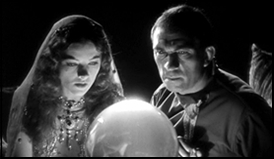
Whether you enjoy this early talkie or not may depend on your tolerance for Fordian sentimentality and the primitive technology of early sound. Stiff dialogue delivered stiffly doesn’t help a great deal either. Compare this to the superior Bulldog Drummond also from 1929 to see just how stiff it is.
What does help is the stunning visuals true to Ford at his best ably abetted by Cinematographer Joseph H. August and some exciting moments thanks to the few times the film actually strays toward Talbot Mundy’s classic pulp novel.
That said, the first twenty minutes of the film are a write off of Fordian sentimentality and unnecessary back story.
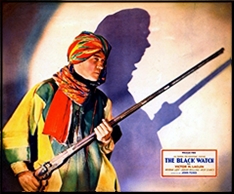
Captain Donald (*) King (Victor McLaglen) of the famed Black Watch Highland Regiment is summoned to headquarters from the Regimental dinner on the eve of sailing for Europe and the early days of WW I.
At headquarters Captain King is told he is needed in the Khyber Pass in India where he previously served in the Khyber Rifles. It seems the hillmen are rallying behind a mysterious woman known as Yasmani who they believe is a goddess. King is to find Yasmani and prevent the hillmen from falling on vulnerable India and sweeping the weakened British off the sub-continent.
As part of his secret service work King cannot let his fellow officers know that he is being sent to India. They have to believe he is deserting the regiment as they march to war for safety in India. He can’t even tell his younger brother Malcolm (David Rollins) who worships him.
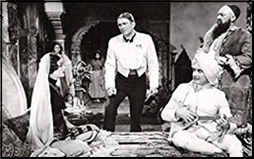
That would be bad enough without a drawn-out scene of the regiment boarding the train for the ship to France and goodbyes to their family along with some much unneeded comedy relief.
It’s twenty wasted minutes. Thankfully Ford will learn to better balance this sort of thing in later films and make a virtue of it (usually). He doesn’t here though there are more than enough Fordian touches.
Things pick up a little in India where the Mundy novel begins in the first place. There King ties up with his old ally Major Mohammed Khan (Mitchell Lewis) who will help him in his mission which begins by attracting the attention of Yasmani (Myrna Loy) and her allies the ambitious Rewa Gunga (Roy D’Arcy) and the savage hillman Harim Bey (Walter Long) both with her longing glances at his manly presence and his heavy drinking and bad behavior leading Gunga to think King will be a good deserter.
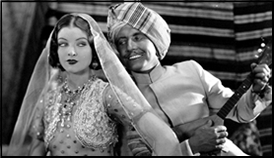
Staging the accidental killing of a fellow officer King “escapes†and is taken in by Yasmani who offers to take him into the Khyber Pass and the infamous Cave of Terror where the hillmen are meeting before sweeping into India. Unlike the character in the book, no one tries to pass Victor McLaglen off as a native in disguise (thankfully) though he does get to don a turban and robes.
The sets and staging for the Cave of Terror scenes are worth the whole film. Though the restraints of budget show Ford and August use imagination, shadow, and smoke to create a genuinely entertaining vision replete with McLaglen battling a native bare chested to prove his worth.
Despite the stiff delivery of dialogue that would read better on a silent title card they actually keep some of the more fantastic elements of Mundy’s novel including Yasmani’s claim to be a descendant of Alexander the Great and suggestions of past lives between she and King.
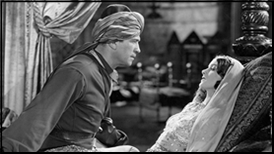
And she almost wins him over to her vision of paradise in her arms as the king of India until she shows him his regiment in France in a crystal ball and he sees his brother Malcolm wounded in battle. Considering how Loy looks in those gauzy outfits, he proves a better man than me. This was from the era when she played exotic roles like the daughter of Fu Manchu and the murderous and vengeful Eurasian in Thirteen Women, gauzy suits her.
A fairly exciting battle between the hillmen and King and Khan’s men armed with machine guns follows shot beautifully in smoke and shadows with captured and blinded Major MacGregor (Francis Ford) who King has freed from slavery leading the troops with King’s sword thrust into his hand.
King doesn’t get the girl, but he does get his Regiment, a happy ending for any Ford film.
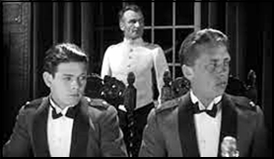
Henry King ignored Mundy entirely for his version of King of the Khyber Rifles with Tyrone Power as a half Indian King. Despite having no relation to the book it was much more exciting even without Yasmani with a splendid set piece for the ending ironically mindful of a similar scene in John Ford’s The Searchers.
McLaglen’s stiff delivery of his lines (Loy is no better) doesn’t help, but he looks great when he isn’t speaking and it is the visuals for this, often mindful of Joseph Clement Coll’s famous illustrations for the book, that make it worthwhile, and Loy is believably ethereal as Yasmani (though there is little ethereal about the vibrant wild child of Mundy’s novels).
Mitchell Lewis and Walter Long fare best in the acting department, playing vibrant over the top characters with an energy you only wish McLaglen and Loy brought to their roles.
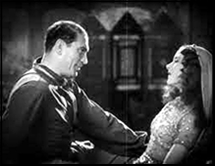
This is an early example of the popular British Raj genre that reached its peak with films like Gunga Din, Lives of a Bengal Lancer, The Four Feathers, and Charge of the Light Brigade. The elements aren’t quite there, but even at this stage Ford hits most of the right notes.
(*) Just why King is named Donald in this is a mystery in itself. In the book his name is Athleston and in the Power version Alan. Donald seems a bit arbitrary.
I’ve yet to spot them but supposedly John Wayne and Randolph Scott appear in this as Highlanders. Considering they are in uniform and shadow much of the film it may take some luck to find them, but the print on YouTube is pretty crisp.
In addition you get a chance to see what McLaglen must have looked like a few years earlier when he was Governor General of Damascus after T. E. Lawrence captured the city.
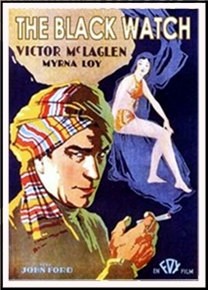
April 15th, 2022 at 10:28 pm
Some random thoughts.
1. I could barely get through it.
2. Anything with Victor McLaglen works for me, same with Loy, but this was not the Myrna Gable worked with, see Test Pilot.
3.I spotted Randolph Scott (?) seated around the mess table in the opening scene. I suppose that was John Wayne next to him, but they are really not in the picture. It’s only trivia Too bad.
The dialogue scenes are not just awful but excruciatingly so. It is my understanding Lumsden Hare directed them, and when Ford saw the completed film, his attitude was similar to ours. Vomit.
April 15th, 2022 at 10:30 pm
Oh, and I like Donald, but shouldn’t Donald be attending mid-western college, have a crewcut, and be pledging a fraternity?
April 16th, 2022 at 12:54 am
I suspected that was the scene Scott and Wayne were in, and the Hare story explains a bit of the bi-polar nature of the film which comes alive whenever it steps back from exposition and dialogue and Ford gets to play with his camera and those gorgeous painterly shots he is fond of.
There are scenes directly taken from those Coll illustrations I mentioned and it is clear Ford referenced them. I suspect that and the regimental business were the chief attractions here aside from finding a role for McLaglen.
It’s ironic this is the only film where McLaglen got to play what he was, a professional British officer (he played plenty of soldiers but usually non coms).
If the dialogue was a bit better he is a perfectly good leading man and works well enough in the love scenes.
I can understand why the screenwriters didn’t use Atlelston, but Donald, Scottish as it may be, seems a bit odd when Alan is the obvious choice and just as Scottish.
Loy had a good career going as Hollywood’s favorite exotic bad girl. She’s a native dancer in RED DESERT, has a very nude bath in THE BARBARIAN, and is Jeanette MacDonald’s slutty sister opposite Maurice Chevalier aside from the two I mention and a Chinese dancer in a short number from a Paramount film.
It seems a bit odd for America’s favorite sexy wife.
Of course, with Gable, Powell, and Cary Grant she would become the biggest female box office star in Hollywood.
Re Wayne, IMDb suggests he also worked on the set as a prop man, which isn’t that far fetched. I’m not sure if this was filmed before or after Scott was Gary Cooper’s dialogue coach for THE VIRGINIAN, but the awkward dialogue scenes suggest this might have been made pretty close to the start of talkies when the technology was primitive.
April 16th, 2022 at 6:18 pm
I remember reading (online and now I can’t find it) an interview with Loy in which she made the comment that the first few years of her career saw her playing Asian/Eurasian roles because of her “slinky eyes.”